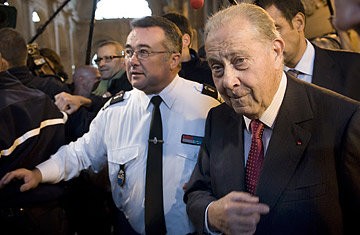
France's former Interior Minister Charles Pasqua arrives at a Paris courthouse for the opening of a trial over a vast France-Angola arms scandal that involves the son of late French President François Mitterrand and dozens of businessmen, politicians and public figures
Need to start a war? No problem. While stock markets gyrate and financial institutions (and even whole countries, like Iceland) teeter on bankruptcy, one global industry is still drawing plenty of high-end trades and profits: weapons.
In a Paris courtroom last week, 42 officials went on trial for taking millions in kickbacks and organizing huge arms commissions from the Angolan government during the mid-1990s. In the dock were such big names as Charles Pasqua, a former French Interior Minister; Jean-Christophe Mitterrand, the son of the late French President François Mitterrand; and Russian-Israeli billionaire Arkadi Gaydamak, who is currently a candidate for mayor of Jerusalem. The group is charged with having supplied almost $800 million worth of arms to Angolan President José Eduardo Dos Santos, including 12 helicopters, 6 naval vessels, 150,000 shells and 170,000 land mines.
The hardware came from the huge stockpiles of Soviet weapons left behind when the Soviet Union collapsed, and Dos Santos wanted it in order to crush the U.S.-backed Unita rebels during Angola's devastating civil war. (Dos Santos, who is believed to have made millions off the trades, won the war and is still in power.) The French businessman Pierre Falcone allegedly plied Angolan officials with tens of millions of dollars — some of it stuffed in suitcases — and deposited other sums of money in offshore accounts. Actor Nicolas Cage's character in the 2005 movie Lord of War was partly modeled on the alleged actions of Gaydamak, although the character may also have been inspired by the powerful Russian arms trader Viktor Bout, who is currently in a Thai jail awaiting the outcome of a hearing on a U.S. extradition request.
Researchers say arms trading has boomed in the decade since the Angolagate scandal was uncovered. That's partly due to heightened supply. As ex-Soviet republics emerged as economic actors in their own right, several countries developed national arms industries, refitting weapons from their stocks and manufacturing new weapons of their own. Those industries have taken off in recent years. Ukraine has about 6 million light weapons from Soviet stockpiles, and has modernized tanks, anti-aircraft missiles and other weaponry, says Hugh Griffiths, an expert on illicit weapons at the Stockholm International Peace Research Institute. A dramatic example of Ukraine's reach is playing out off the Horn of Africa, where a major shipment of Ukrainian weapons, including 33 T-72 tanks, was hijacked by Somali pirates and remains a vexing military and diplomatic problem.
